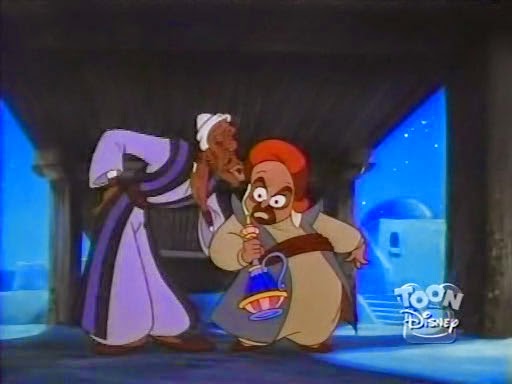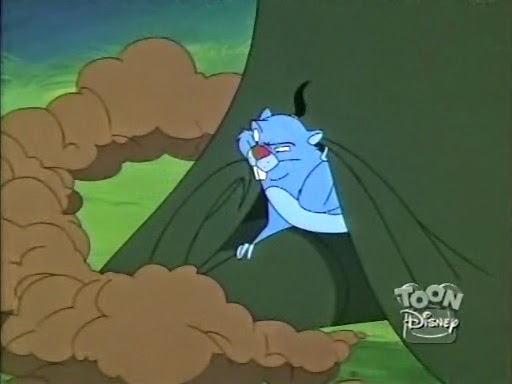________________
Last Sunday, I attended a special screening at Amherst Cinema.
Hard to believe that it's 22 Christmases since, at the age of 11, I saw it at the theater during its original release with my parents and sister. Being that my earliest memories are of watching reruns of The Muppet Show in syndication and that it was the first show that I was crazy about, it was very, very considerate, kind, and generous of my parents to take us. (And my sister was a good sport in coming along. But it made me very happy when, during the opening scene, she recognized Doc's companion from Fraggle Rock and whispered to me from her seat, "Ryan, Sprocket!"
The first Muppet feature film to be produced without Jim, when seeing it for the first time in 1992, I was very moved when the film began rolling and the dedication below appeared on the screen. It was a powerful, solemn moment. (This time, I applauded.)
In the post-Jim Henson world, until 2012's The Muppets (which not only was clearly a dream project for Jason Segel, but he had a deft understanding of what makes the Muppets tick), I was almost convinced that I would ever again see a new Muppet production that I didn't find heartless and to be trying too hard. For some reason, though, Christmas Carol, hit upon a certain magic. I don't know if Jim's spirit was still lingering, or if it was the raw emotion from the Muppet team having been dealt such a massive emotional blow -- especially director Brian Henson, Jim's son. Or maybe it's just that Brian had a "special touch" similar to his father's -- however much of it is Brian, it's worth noting that its lacking in all the subsequent projects that he hasn't been involved in.
Whatever the case, Christmas Carol's "magic" is an earnest romanticism and its vivid, detailed (liberty-taking) period piece approach. In part, these qualities and can be attributed to the essential trappings and sentiment of the source material. Dickens' classic story (I'm not saying that because I think that it's the thing to say; I consider it a classic) is so good, it's hard to do wrong, and so all of the good things about it would inevitably carry out, right? As if, when chosen to be told, it comes to life and tells itself, more or less? Think again: consider Hanna-Barbera's bland, uninspired 1994 animated TV movie A Flintstones Christmas Carol.)
Whatever the case, Christmas Carol's "magic" is an earnest romanticism and its vivid, detailed (liberty-taking) period piece approach. In part, these qualities and can be attributed to the essential trappings and sentiment of the source material. Dickens' classic story (I'm not saying that because I think that it's the thing to say; I consider it a classic) is so good, it's hard to do wrong, and so all of the good things about it would inevitably carry out, right? As if, when chosen to be told, it comes to life and tells itself, more or less? Think again: consider Hanna-Barbera's bland, uninspired 1994 animated TV movie A Flintstones Christmas Carol.)
So, let's think in terms of practicality, and try to get a handle on what this movie has going for it and why it works:
1. The rich sets. costumes, lighting, and cinematography (from the drab stuffiness of young Scrooge's classroom to "Fozziwig's" bright, joyful, mirthful party to the warm, gilded glow of the Ghost of Christmas Present's "spread" that Scrooge finds in the room adjoining his sleeping chamber). These aesthetics bring intto realization a romanticized only slightly surreal and fantastical vision of Dickens' 19th century London-in-December.
2. Paul Williams' incredibly tasteful score and songs, with their minor key melodies and string-and-brass-heavy arrangements. Though clearly following the traditions of 20th century showtunes, they still are very fitting to, and greatly enhance, the movie ambience of the movie's "reimagined" fantasy Victorian setting.
(The following year, a certain other Christmas movie that featured puppetry of a different sort went REALLY overboard on the outlandishness in its sets and music. [Christmas Carol only becomes truly ghastly and distorted in the Christmas Yet-to-Come scene.] The latter film's visual and aural elements alike have since become deeply embedded, iconic -- albeit niche -- pieces of pop culture. While a part of me may resent that by comparison, Muppet Christmas Carol hasn't gotten its due, I can take solace in that least half of every topic isn't devoted to merchandise based on it.)
3. The casting ... of the Muppets. They seem to have not made it a priority to give all of the "major" characters an important role (e.g., Miss Piggy and Fozzie have minimal screen time), taking care so that each Muppet was a "natural fit" in their role, allowing each to simultaneously be his or her "self" and the character they're "playing". Also, commendable discretion was used in not casting known Muppets as the Ghosts of Christmas Past, Present, and Future, instead following a purist's approaching, creating original Muppets(*) that are wholly based on Dickens' conception of each of these three entities. They're supposed to be unfamiliar and not of "this" world. Kermit's familiarity to the audience makes him as protagonist an easy sell. (I know, someone out there wants to chew me out, as Scrooge is actually the protagonist. I used the term for its connotations.) Thus, the juxtaposition between such a "grounding" character and the alien-ness of the ghosts (besides arguably having been more more stark) allows this iteration of the story to, at least in my opinion, retain the severity of the orignal's thrust. (More on this below.)
(*) Christmas Present, with his felt flesh-toned "skin" and general sweetness strikes me as a formal Muppet, while Past and Yet-to-Come seem like they would have come out of the Creature Shop. However, the credits don't indicate such. But I'm sure there was some crossover in staff.
4. Successfully walking the fine line between telling the story straight, hitting all of the right cues in terms of drama and suspense, while simultaneously being a spoof. It's crucial to note that it succeeds at the latter but is never a mockery, keeping all the Muppet-ian puns, absurd behavior, and physical comedy on an even keel, giving it consistent zest and spice without detracting from the main ingredient. And how is this consistency achieved? Delegating much of the comedic asides to a "narrator", Gonzo, and his "assistant", Rizzo was a very astute move -- in this function, they are explicitly removed from the story, allowing it to retain its, if you will, dignity. The Ghost of Christmas-Yet-to-Come scene is considerably dark, with said ghost's visage beingactually quite scary, but that in sensing the reaction of the kids in the audience, Gonzo and Rizzo's single moment of levity during this sequence (informing the audience in hushed tones that the proceedings are too scary and that we're "on [our] own" until "the finale") broke the tension at just the right moment ... a very fleeting moment, at that; we then resume -- with no flinching -- the so-tense-you-feel-like-you're-about-to-be-a-squished-tomato buildup to the revelation of the name on the tombstone and the outpouring of unabashed pathos that immediately follows. As far as I'm concerned, Michael Caine nails this scene -- if there's an audience that would laugh "ironically" at the melodrama, I don't want to sit in a theater with it.
...and how have I not addressed the lead role? In casting a real person as Scrooge, Scrooge's "non-Muppetiness" and innate "Scrooginess" are emphasized. Michael Caine, a fan of The Muppet Show who professed that he had always been jealous that he was never one of its guest stars and so relished that he "got to do a whole movie", was only too happy to be part of this movie. Having Scrooge played straight, much like the three spirits, is a move that at least has the right idea in preserving the story's austerity, but having a world-class actor whose completely sincere and fully invested in his performance is what brings the whole thing home. (And though Scrooge being a real person and not a Muppet sets him apart from them, having other "live" human actors interspersed throughout the crowds of London's Muppet denizens affirms that he's part of their earthly world, allowing the three spirits to be just as unearthly in contrast with him as they are in contrast with Kermit and Robin.)
My favorite song from the film (drove my whole family crazy by incessantly playing it over and over, day after day, rewinding -- and possibly fast-forwarding, at least a little -- the cassette tape after each play until I found "the right spot" so that I could hear the whole thing again ... and again, and again, and again, and again ...):
Unfortunately, the above YouTube upload does a disservice to the song by jumping in after it has actually begun -- here's the full version, sans video:
Though I've seen the movie many times over the years, seeing it in the theater again really transported me back to that Saturday afternoon at Showcase Cinemas all those years ago. More than once, it struck me, "This is just how I remember it." Even though it's clearly been the same exact movie every time that I've seen it on VHS and, more recently, on the Internet, there's something about seeing it on "the [a] big screen" ... it's not just a matter of scale, but of environment and perspective/vantage point. This time around, I was particularly struck by the cinematography in the build-up to Marley "and Marley" appearing to Scrooge -- it was clearly inspired by horror movies (the more classy, atmospheric type, not slasher flicks!) Unfortunately, the only version of not just the song "Marley and Marley" but this scene in full, including the "creepy" build-up sequence that I'm talking about, is in German. But you should be able to get the idea:
(Pretty good dubbing and mindfulness of the original voices, I must say!)
________________
I'd like to get one more Aladdin review in before the New Year. I have been giving much apprehensive thought to instituting a length cap, so that it won't take me until 2025 to get through the whole series. However, I only meant to write one or two short, casual paragraphs about The Muppet Christmas Carol in this post, and look how that turned out.
________________
Merry Christmas, Chris, Joe, Joseph, Geo, David, Mom, and whoever else who might be reading!
-- Ryan


















































